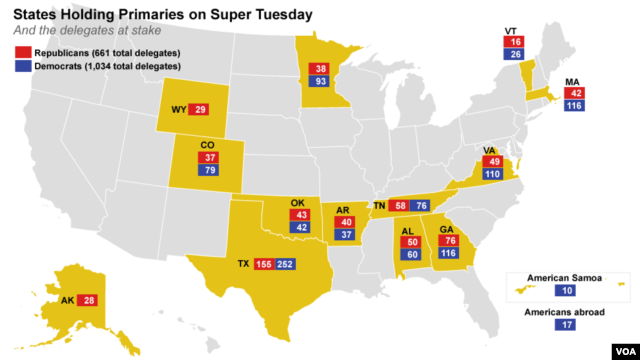
Super Tuesday Mega-Vote Could be Key to Presidential Nomination
Greg Flakus
HOUSTON, TEXAS—For Republicans, Super Tuesday may be the last chance for candidates to blunt the momentum of front-runner Donald Trump, the real estate billionaire from New York. For Democrats, the voting contests from Massachusetts to Texas could determine if Vermont Senator Bernie Sanders can remain viable as former secretary of state Hillary Clinton’s momentum builds.
Voters in 13 states and one U.S. territory (American Samoa) are set to cast ballots in primaries and caucuses Tuesday. It is unlikely that a candidate in either party will win sufficient delegates to claim the nomination, but a big win in several delegate-rich states could provide the momentum needed to close the deal with wins in upcoming primaries.
About half of the delegates needed to win the Republican nomination are in play, but Super Tuesday delegates are awarded proportionally, so no one candidate could win all of them. However, Trump could win a big enough portion of the total delegates to cinch the nomination if he wins a large enough percentage in each state.
Is Trump unstoppable?
Trump has won every contest so far with the exception of the Iowa caucuses, which Texas Senator Ted Cruz won. Trump beat Cruz in subsequent races, including the primary in South Carolina, which pundits expected Cruz to win because of his strong appeal to Christian evangelicals there.
According to recent polls, Cruz maintains a lead in his home state of Texas, which has 155 of the 595 Republican delegates at stake. But Trump contends he could upset Cruz here.
«He’s not winning in Texas,» Trump said. «We are tied in Texas, according to the last poll, and I am beating him in every other state by tremendous numbers.»
Cruz has spent more time than might be seen as necessary campaigning on his home turf. A loss to Trump in Texas would be a disaster for Cruz and effectively end his campaign.
Florida Senator Marco Rubio has emerged as the possible surviving candidate from Super Tuesday who can continue the challenge to Trump. In order to stay viable, he needs to at least come in second in a number of important states and make a good showing among conservatives in southern states.
Trump’s visceral appeal
Bill O’Sullivan, treasurer of the Texas Patriots PAC, said many conservatives may back Trump because his plain-spoken, often harsh, rhetoric expresses the frustration and anger they feel.
«People are reacting viscerally to Trump,» he said. «It is a gut reaction that has a lot to do with frustration with the system.»
Rice University Political Science professor Mark Jones understands Trump’s visceral appeal, but finds him an odd choice for conservatives.
«His position is closer to that of a Democrat than any of the other major Republican candidates, in terms of his past support for something akin to Obamacare, his more protectionist economic policy,» Jones said.
Many voters speaking to pollsters and reporters in recent weeks have expressed their approval of both Trump and Democratic candidate Sanders, an avowed socialist, who is far to the left of even many Democrats, let alone conservative Republicans. Jones said that is because most voters are not tied to ideology as much as they are to the idea of choosing an outsider who will upset the established system in Washington.
The Democratic contest
Sanders has presented a much stronger challenge to Clinton than most political experts thought possible six months ago. But his campaign, based on small donations and no corporate money, is struggling against a mighty war chest that large donors have filled for Clinton.
Clinton also counts on support from prominent Democrats, union heads and minority group leaders.
Texas awards 222 of the 865 total Democratic delegates at stake on Super Tuesday, but Sanders has not spent much time here. He has concentrated on must-win states like Minnesota and Massachusetts, where Clinton is now close in the polls.
Sanders strength among youth
But Sanders’ supporters are active here as elsewhere, working on the grass-roots level. At a recent gathering near downtown Houston, Cesar Vargas, a campaign worker from New York, described the movement as «real people coming together because we have had enough of the same political establishment, the same political game.»
What has boosted Sanders in every state where he has done well has been his appeal to voters under 30. Take Kayenta Smith — the 17-year-old can’t even vote yet, but she has volunteered to make phone calls on Sanders’ behalf.
«He is not afraid of the label of being socialist,» she said. «He is a strong candidate because he stands up for what he believes in.»
Smith, who has lived in Canada and Britain, where some form of socialist medicine is available, said she thinks such programs are beneficial. She said she would willingly pay higher taxes to support free education and free health care for everyone.
Practical vs. fervent
But that is a tough sell, especially in conservative Texas, where even most Democrats reject socialism. Clinton has condemned Sanders for not explaining how he would pay for such programs, while at the same time trying to reassure young voters that she supports the same overall goals.
Given the fervor of Sanders’ supporters and their view that Clinton is part of the old guard standing in the way of progress, Clinton faces a tricky challenge. She needs to defeat Sanders for the nomination while not alienating his youthful supporters, whose votes she will need to win the general election in November.


